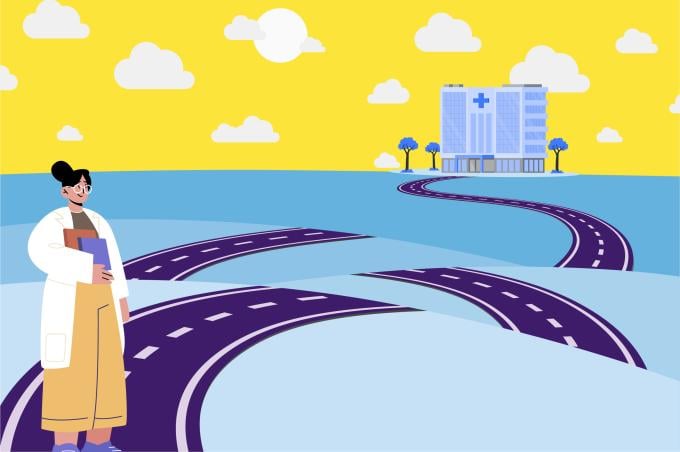Monday of Match Week can bring disappointing news for some medical students participating in the 2025 Main Residency Match®. A small percentage of residency applicants will find out on that date—March 17—that they did not match. While time and space are limited, there is hope for those students who do not match.
The Supplemental Offer and Acceptance Program® (SOAP®) is a vehicle through which eligible unmatched and partially matched applicants in the Main Residency Match apply for and are offered positions that were not filled when the matching algorithm was initially processed. On Monday morning of Match Week, applicants learn whether, but not where, they matched. Match status notifications will be sent by email. To apply to an unfilled position through SOAP, applications are submitted through the Association of American Medical Colleges (AAMC) Electronic Residency Application Service® (ERAS®).
In 2025, SOAP runs March 17–20. There are multiple SOAP Offer Rounds. In each Offer Round, applicants have two hours to accept or reject offers in the system. Offers not accepted or rejected expire automatically. As has been the case since the 2021 application cycle, a fourth offer round has been added to SOAP. The rationale behind that decision, according to the National Resident Matching Program (NRMP), is that there has been an increase in the number of unfilled positions remaining after the SOAP process.
FREIDA™, the AMA Residency & Fellowship Database® , enables unmatched students to research residencies from more than 13,000 programs both during and following SOAP. Access is free, but extra benefits—such as a dashboard that helps users save, rank and keep notes on each program—are available to AMA members.
Veterans of the Match process offered guidance for medical students who may have to enter SOAP. Here are some of the most relevant nuggets of advice.
Should I use SOAP to find a position in a specialty that’s not my first choice?
“As an applicant, you have to decide whether the specialty you aspired to match into is something you will try for again or whether you will be happy in something else as well,” said AMA member Christopher Libby, MD, MPH, “You can’t begin to form a strategy if you don’t answer that first.”
Dr. Libby advised that applicants who are at risk of not Matching assess their application.
“Most, not all, U.S. applicants who did not match have a weakness in their application,” he said. If it is a board score or some disciplinary action, then some competitive specialties may not be realistic, especially in the SOAP.”
One method to determine is to do a modified SWOT (strengths, weaknesses, opportunities, threats) analysis.
Ask yourself “What are the strengths of practicing this specialty? What are the weaknesses that I would not enjoy, said Dr. Libby an emergency medicine physician at Cedars-Sinai in Los Angeles.
“What about this clinically would I not like? What are the opportunities available in the specialty that would appeal to what I liked about emergency medicine? What are the threats to the other aspects of my life based on this specialty?”
If you are certain you want to reapply to the specialty in which you did not match, Dr. Libby offered that medical students might want to pursue a preliminary residency.
Dive deeper:
- If you don’t match, take these 5 tips from a SOAP survivor
- Match: Which specialties place most residents through SOAP
- “Meet Your Match”: How to find a position through SOAP
- What to know about preliminary, advanced GME positions
If I get an offer through SOAP, should I take it?
“I definitely recommend a student take the first offer they receive, rather than wait for the second round” of SOAP, said Nicole Deiorio, MD, professor and associate dean, student affairs in undergraduate medical education at Virginia Commonwealth University. “The availability of openings goes down dramatically for the second round, so it doesn't make [strategic] sense to “hold out for something better.”
“In general, I also recommend applicants use all 45 applications in the first round [of SOAP], although this should be discussed on a case-by-case basis with an adviser.”
The AMA Road to Residency series provides medical students, international medical graduates and others with guidance on preparing for residency application, acing your residency interview, putting together your rank-order list and more.
Dive deeper:
- “Meet Your Match”: How a physician found a residency slot outside the Match
- The SOAP process—what applicants need to know
- Key advice on for unmatched applicants
- “Meet Your Match”: A guide to reapplying
How should you decide where to apply?
After not matching in orthopaedic surgery, AMA member Victoria Gordon, DO, was able to find an emergency medicine position through SOAP. While acting quickly is key, she said you should still consider your personal preferences where you can.
“SOAP applicants are given 45 tokens,” Dr. Gordon said during a recording “Meet Your Match” series, as part of the “AMA Making the Rounds” podcast. “You might as well put all your chances out there.”
“I didn't apply anywhere I didn't want to live because if I was going to be changing specialties and changing my life, I wanted to have at least a benefit in location or type of program.”



